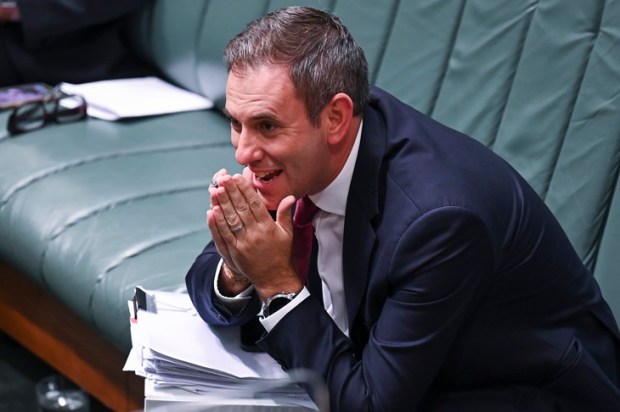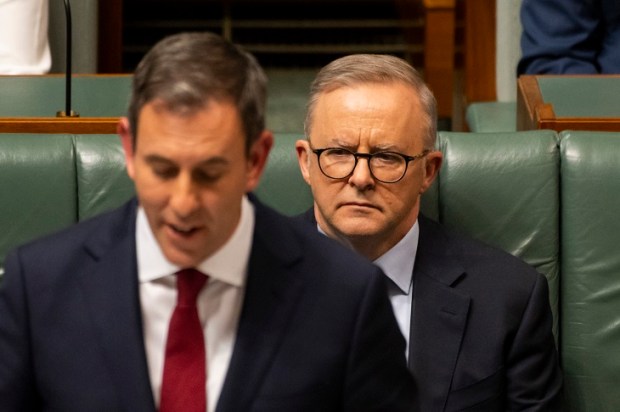‘Blindsided’ is the best word for it.
On December 7 last year in the Senate, two independents – Senator David Pocock and Senator Jacqui Lambie – sided with the Labor Party and pushed through major chunks of the Industrial Relations Loophole Bill. I have previously described this Bill in The Spectator Australia as ‘revolutionary’.
Blindsided is the correct description, because both Senators Pocock and Lambie were instrumental in establishing a Senate committee to investigate and report on the Loophole Bill. The Committee is due to report in late January, with Parliament resuming on February 6. The expectation was that nothing would happen with the Bill until after the Senate report. Senators Pocock and Lambie had other ideas.
The Albanese government needs two of the eight independents to vote with Labor to pass legislation in the Senate. In passing major sections of the Bill, Pocock and Lambie have established themselves as the most powerful players in Parliament. The direction of the nation rests with them.
But what did they pass into law? Included with the ‘uncontroversial’ sections related to work safety and illness compensation is one small instrument that attacks family businesses. It gives unions massively expanded entry and control power over any business in Australia. For the first time, a union can walk into a business that has only one employee and issue dictatorial orders. On my assessment, union reps now become de facto political commissars implanted in Australian businesses, including very small businesses.
What’s the message here? Simple. If you have a business idea, it’s dangerous to employ anyone. And Pocock and Lambie lumped these two provisions, which they enabled, into their ‘uncontroversial’ basket. Both stand condemned as anti-small and anti-family business.
It’s not only me passing this comment. Here’s what the doyen of Australian business commentary, Robert Gottliebsen, said. He called the move ‘…an unprecedented attack on the more than 900,000 family businesses that employ people’ and ‘…the biggest change in business capitalism for a generation’. Gottliebsen commented further:
‘In particular Pocock, who set himself up as a true independent and an advocate for family business, turned out to be simply a Trojan horse.’
I totally agree with Robert Gottliebsen. In my view, Senator Pocock has trashed his reputation as a true independent and advocate for small business.
There’s more to come. The balance of the Loophole Bill involves the legislative outlawing of self-employment with the near abolition of casual workers. Further, it gives the industrial relations regulator, the Fair Work Commission, the power to override the Australian Consumer and Competition Commission on competition matters. That is, if a business colludes with a union to damage competitors, that becomes lawful. And there’s more. I provided an overview of this before in Spectator Australia.
Senators Pocock and Lambie have been silent on where they stand on these remaining issues. Given their blindsiding of the Senate and Australia in December, it has to be assumed that they will back the passage of the rest of the Loophole Bill. With this in mind, I’ve written an open letter to Senator Pocock laying out the situation and asking him to be upfront as to where he stands. This letter lays out the facts. So far, no response has been received.
January 4, 2023
Dear Senator Pocock,
You are no doubt aware of our criticism of you, posted on our website on December 14, 2023. This criticism relates to your central and critical role in working with the Labor government to pass a highly controversial section of the Loophole Bill on December 7, 2023.
The objectionable content
That (now-passed) section gives designated union representatives extensive legal ‘rights’ to interfere in (and based on our experience, to effectively control) any Australian business. This includes even small businesses where the individual person running their own business employs only one person.
This legal right – gifted to one person to interfere in and effectively control the business management decisions of another person – comes with no responsibility or consequences for the person who has been allocated that controlling right.
This is an extremely dangerous law that destroys a key notion of legal responsibility in our society. People running their own small business, or even people running large businesses, have imposed upon them onerous personal obligations and direct personal responsibilities for their actions or failures. The law that you have enabled gives effective controlling power to one person (a union delegate) to require actions of another person (the business person/individual) who then carries the responsibility for the consequences.
The immediate consequence of this is the defilement of a core principle of justice in our society – namely, that individuals are responsible for their actions.
We have to ask: Where, in any section of the Bill that has been passed, are union delegates held liable and responsible for their actions?
On the practical level, a law that grants power without responsibility attacks a core motivational trigger in our society – namely, the ability and willingness of individuals to get off their tail/s and start a business of their own and then run it.
People who have been in business for themselves work hard and put everything ‘on the line’ to pursue a vision, a belief to better themselves and their loved ones. To do this, they must have clear control within the scope and framework of the laws with which they must comply. But where a law imposes not only legal parameters, but an overseer with the power to micro-dictate decisions, the pursuit of that vision has a noose placed around its neck. And that leads to corruption.
Why does corruption occur? Because when third parties have control or partial control of a business and those third parties bear no responsibility for their control, then the third party will expect, demand, and induce ‘payoffs’ from the people running the business. To suggest that this does not occur would reflect naivety about the reality of human behaviour.
Senator, it may be that you have another explanation for your support for this law that you created on December 7. Maybe you have another perspective. But we think it reasonable of us to make it clear to you why our criticism is so strong.
But there is also another element to our criticism. This second element concerns the process that you followed to effect the passing of the split Loophole Bill on December 7, 2023.
Breach of trust
You will be well aware of the following:
- After the introduction of the Loophole Bill in early September 2023 you were instrumental in having the Bill referred to a Senate Inquiry. We congratulated you for this.
- You were active in the Senate Inquiry process.
- Further, you conducted extensive consultations which were heavily focused on small business issues. We took active part in a number of those consultations. We congratulated you on this.
- On November 6, 2023, you moved to split the Bill to seek to pass ‘uncontroversial matters’. We congratulated you on this. The split Bill passed in the Senate with the support of the independents. The government rejected the split Bill in the House of Representatives.
- The Senate Inquiry is due to report in early February 2024.
The events outlined above generated an expectation that the Loophole Bill would be subject to further consideration once the Senate Inquiry had reported in February. It is our understanding that Senate convention is that consideration of Bills waits until after Inquiry reports have been released.
Without warning, on December 7, 2023, you sided with the government to pass the new ‘split’ Loophole Bill that included the union delegate ‘right of entry’ we refer to above.
If you had been successful in passing the split Bill that you attempted on November 6, we would have been full of praise. But the inclusion of the ‘right of entry’ provisions destroys any capacity for praise to which you would have been entitled.
By supporting the section on ‘delegate rights’ on December 7 you have, from our perspective, severed any trust we feel we can have in you to follow the consultative processes that you yourself were instrumental in establishing.
What you have signalled, from our perspective, is that:
- The Senate Inquiry process was pointless.
- The Senate report will be pointless.
- The consultations you conducted with small business were pointless and meaningless.
Senator, you are perfectly entitled to make decisions as you see fit. You have that power and parliamentary capacity. We accept and acknowledge that in your consultations you have diligently asked questions and sought information. And in our experience you have mostly stayed mute about your views on the ‘contentious’ issues. That is also appropriate during consultations and is (again) your right. Where your view became clearly known was in your actions on November 6 when you sought to pass certain ‘uncontroversial’ elements of the Loophole Bill. However, the passing of the highly controversial ‘right of entry’ provisions was, in our view, a blind-siding of small business people.
You will be aware that you have been referred to in The Australian as a ‘Trojan horse’. Certainly, the Labor Party has a long history and is adept at presenting ‘headlines’ on issues deflecting analysis from the true effect of a Bill. Your apparent silence on the union delegate ‘control’ of business issue has us puzzled. What are your reasons?
It is for this reason – the collapse of our trust in the consultative process with you – that we are now placed in a position where we must make a decision.
Your next steps
We must assume that you will likewise blind-side small business and the Australian community and pass the balance of the Loophole Bill – that is, the rest of the controversial sections of the Bill.
We believe that you are well aware of our strong objections to the balance of the Loophole Bill. In our briefing papers supplied to your office and in our submission to the Senate Inquiry we have made it clear that the following sections of the original version of the Loophole Bill are objectionable and should be rejected.
Specifically, this means rejecting:
15AA (Page 113) Determining the ordinary meaning of employee and employer
15H (Page 123) Meaning of services contract
15 L (Pages 126 to 128) Meaning of digital platform work
15 P (Pages 126 to 128) Meaning of employee-like worker
Part 16 (Pages 128 to 139) Regulated workers – Road Transport
Chap3A (Pages 131 to 190) Regulated worker
536JX (Page 153) FWC vs ACCC – Competition law
And we include rejection of
15A (Pages 5 to 21) Meaning of casual employee
And that any other sections of the Bill that relate to, or involve implementation of, the foregoing sections also be removed from the Bill, as they will become redundant once those sections are removed.
Senator, our calls for the rejection of these sections is based on the fact that to pass these sections involves a complete dissolution of fundamental underpinnings of how the Australian economy is regulated. That is, they remove the clear and necessary distinction between industrial relations law/regulation on the one hand and commercial/competition law/regulation on the other. These sections of the Bill are not some mere ‘tweaking’ of industrial relations law. They do not ‘protect’ small business people, but rather legislatively remove the right to be a small business person. These sections follow the axiom that to ‘protect the village it is necessary to destroy it!’
In our papers and submissions, we have made it quite clear how small business people, including self-employed independent contractors, need and can be afforded further protections. We believe actions on the items we have raised should be policy and law.
Senator, given that we have no idea where you stand or are likely to stand on the Loophole provisions (above) that we oppose, we believe it responsible of us to ask if you would be interested in providing us your views/positions. Our engagement process with you to date has been, for the most part, constructive and appreciated. But, as stated, that trust has recently been broken for the reasons we stated above.
Passage of the sections of the Bill we highlight above would, in our view, constitute a betrayal of Australian small business people and demonstrate an anti-small business stance.
Given that parliament is due to resume in early February 2024, we are looking to make decisions on what we need to do by mid-January 2024. The timelines are tight.
We send this correspondence to you as a public document that we will publish on our website.
With thanks for your considerations.
Ken Phillips also publishes on Substack.
Got something to add? Join the discussion and comment below.
Get 10 issues for just $10
Subscribe to The Spectator Australia today for the next 10 magazine issues, plus full online access, for just $10.


























Comments
Don't miss out
Join the conversation with other Spectator Australia readers. Subscribe to leave a comment.
SUBSCRIBEAlready a subscriber? Log in